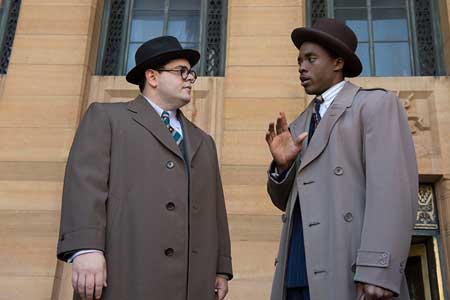Film (2017)
Directed by Reginald Hudlin
Screenplay by Jacob Koskoff, Michael Koskoff
With Chadwick Boseman (Thurgood Marshall), Josh Gad (Sam Friedman), Kate Hudson (Eleanor Strubing), Sterling K. Brown (Joseph Spell), Dan Stevens (Loren Willis), James Cromwell (Judge Foster)

Chadwick Boseman as Thurgood Marshall
in “Marshall”
Image: Courtesy of Open Road Films
In the early 1940s, an African-American man, Joseph Spell (Sterling K. Brown), is on trial for rape in Bridgeport, Connecticut. A white woman, Eleanor Strubing (Kate Hudson), has sworn that he entered her bedroom, forced himself upon her, tied and gagged her and then threw her off a bridge. A young, confident and eloquent Thurgood Marshall (Chadwick Boseman) is called upon, as lawyer for the NAACP to take charge of cases in which racism is strongly suspected, to defend Spell.
There are, however, complications. Marshall is not on the bar in Connecticut and he must wangle his way in before he can actively take charge of the case. By a kind of odd chance he gets involved with Sam Friedman (Josh Gad), a Jewish lawyer in the area who has no experience with criminal cases, and together they begin to pursue Spell’s defense.
Hearing the case is Judge Foster (James Cromwell), a stiff and harsh presence who prevents Marshall from litigating directly; Friedman is forced, despite his majestic lack of experience, to handle that with intermittent prompts from Marshall, who is allowed to sit at the defense table. Meanwhile, the snippy and very Anglo-Saxon prosecuting attorney, Loren Willis (Dan Stevens), takes endless swipes as Friedman, coached by Marshall, parry and thrust.
The evolution of the case meets a dramatic turn as Marshall unveils the shockingly obvious truth.
The chemistry of this fine, though somewhat long, film, is exceptionally good. Chadwick Boseman’s Marshall is elegantly on target, turning the young, brash, talented and brilliant lawyer into a legal superhero. Josh Gad’s Sam Friedman is a wonderfully frumpy complement. Gad’s lumbering efforts to avoid the case make the evolution of the partnership that develops that much more significant and persuasive. One need only wait until the final credits to get a full sense of that historic partnership and its effects on Friedman to feel the full force of the film.
Supporting cast is also very good. Kate Hudson struts and weeps and competently displays the passionately disturbed countenance of an unhappy Connecticut society lady. Dan Stevens is a truly irritating prosecutor, as meanly white-bread as he can possibly be. And James Cromwell, in a role almost created for his talents, offers a stodgy creepiness that of course shows its cracks when necessary.
This portrayal of Thurgood Marshall’s early accomplishments echoes with significance as the full history of his career is spelled out at the very end. It is an eloquent tribute to this great American jurist.
There are some violent moments in the film which exhibit something of the era’s viciousness, and represent an example of the personal, in addition to the moral, courage, Marshall, Friedman and those who pursued civil rights passionately and insistently demonstrated.
George Stevens Jr’s eloquent and informative one-man play, Thurgood, given a brilliant rendition by Johnny Lee Davenport at the New Rep last season, is worth seeking out for those inspired by this film and by Marshall’s great example.
– BADMan
Leave a Reply